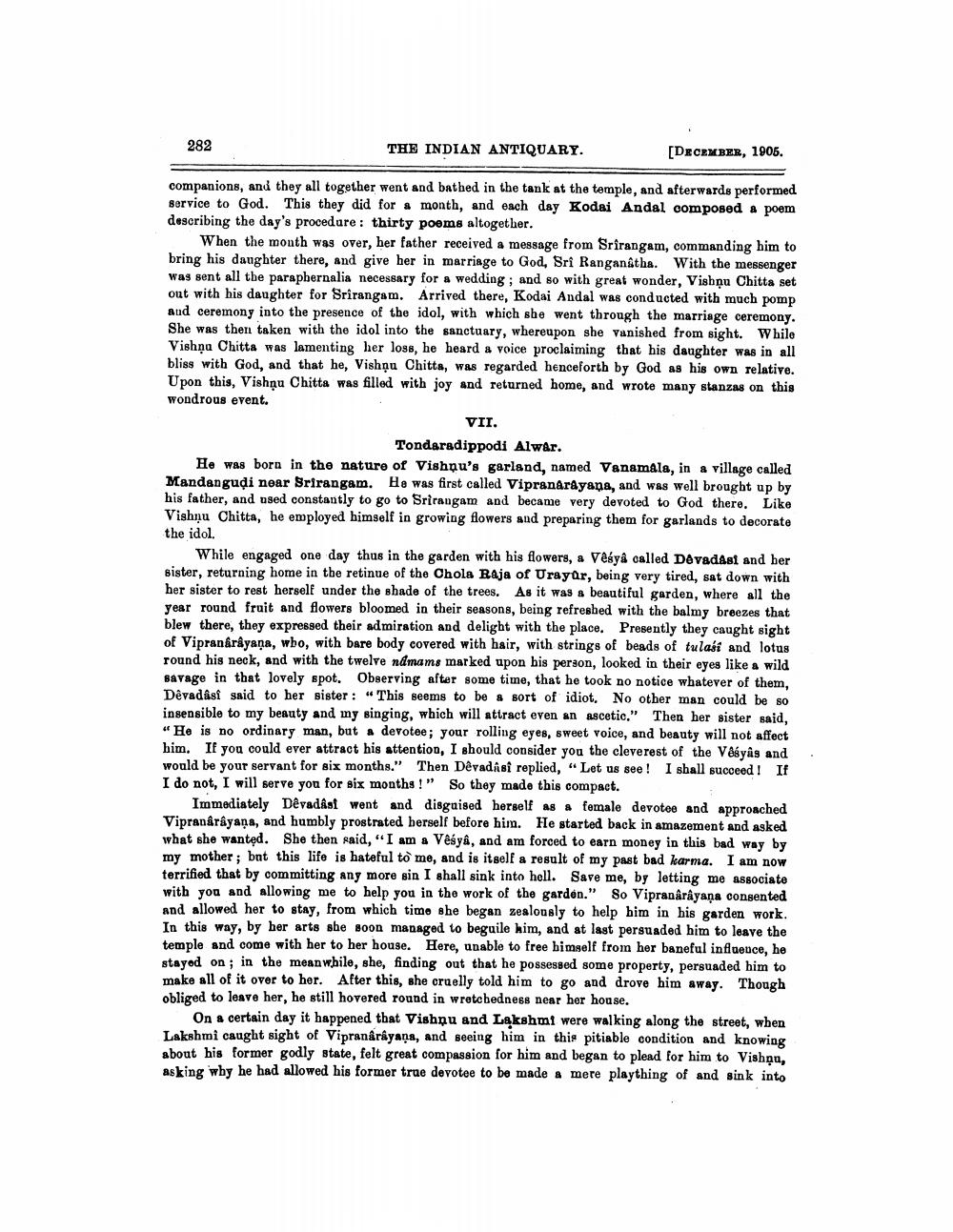________________
282
THE INDIAN ANTIQUARY.
[DECEMBER, 1906.
companions, and they all together went and bathed in the tank at the temple, and afterwards performed service to God. This they did for a month, and each day Kodai Andal composed a poem describing the day's procedure : thirty pooms altogether.
When the month was over, her father received a message from Srirangam, commanding him to bring his daughter there, and give her in marriage to God, Sri Ranganatha. With the messenger was sent all the paraphernalia necessary for a wedding, and so with great wonder, Vishnu Chitta set out with his daughter for Srirangam. Arrived there, Kodai Andal was conducted with much pomp and ceremony into the presence of the idol, with which she went through the marriage ceremony. She was then taken with the idol into the sanctuary, whereupon she vanished from sight. While Vishņa Chitta was lamenting her loss, he heard a voice proclaiming that his daughter was in all bliss with God, and that he, Vishnu Chitts, was regarded henceforth by God as his own relative. Upon this, Vishnu Chitta was filled with joy and returned home, and wrote many stanzas on this wondrous event.
VII.
Tonderadippodi Alwar. He was born in the nature of Vishnu's garland, named Vanamala, in a village called Mandangudi near Srirangam. He was first called Vipranarayana, and was well brought up by his father, and used constantly to go to Srirangam and became very devoted to God there. Like Vishnu Chitta, he employed himself in growing flowers and preparing them for garlands to decorate the idol.
While engaged one day thus in the garden with his flowers, a Vēsya called Dovadasi and her sister, returning home in the retinue of the Chola Raja of Urayar, being very tired, sat down with her sister to rest herself under the shade of the trees. As it was a beautiful garden, where all the year round fruit and flowers bloomed in their seasons, being refreshed with the balmy breezes that blew there, they expressed their admiration and delight with the place. Presently they caught sight of Vipranarayana, wbo, with bare body covered with hair, with strings of beads of tulasi and lotus round his neck, and with the twelve namams marked upon his person, looked in their eyes like a wild savage in that lovely spot. Observing after some time, that he took no notice whatever of them, Dêvadásf said to her sister: "This seems to be a sort of idiot. No other man could be so insensible to my beauty and my singing, which will attract even an ascetic." Then her sister said, "He is no ordinary man, but a devotee; your rolling eyes, sweet voice, and beauty will not affect him. If you could ever attract his attention, I should consider you the cleverest of the Vêsyâs and would be your servant for six months." Then Dêvadási replied, “Let us see! I shall succeed! If I do not, I will serve you for six months !" So they made this compact.
Immediately Dêvadást went and disguised herself as a female devotos and approached Vipranarayana, and humbly prostrated herself before him. He started back in amazement and asked what she wanted. She then said, "I am a Vêśyâ, and am forced to earn money in this bad way by my mother; but this life is hateful to me, and is itself a result of my past bad karma. I am now terrified that by committing any more sin I shall sink into hell. Save me, by letting me associate with you and allowing me to help you in the work of the garden." So Vipranârâyaņa consented and allowed her to stay, from which time she began zealously to help him in his garden work. In this way, by her arts she soon managed to beguile him, and at last persuaded him to leave the temple and come with her to her house. Here, unable to free bimself from her baneful infidence, he stayed on; in the meanwhile, she finding out that he possessed some property, persuaded him to make all of it over to her. After this, she cruelly told him to go and drove him away. Though obliged to leave her, he still hovered round in wretchedness near her house.
On a certain day it happened that Vishnu and Lakshmi were walking along the street, when Lakshmi caught sight of Vipranârâyaņa, and seeing him in this pitiable condition and knowing about his former godly state, felt great compassion for him and began to plead for him to Vishņu, asking why he had allowed his former true devotee to be made a mere plaything of and sink into




